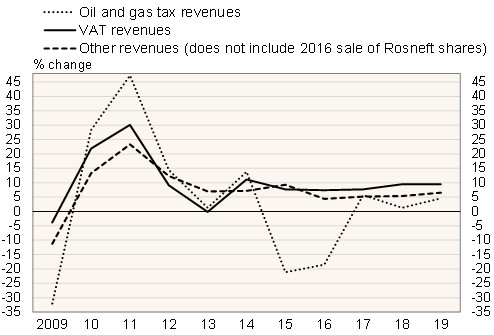BOFIT Weekly Review 45/2016
Russia plans to increase government revenues in the next few years without hikes in large general taxes
In the draft 2017‒2019 federal budget submitted to the Duma, the finance ministry computed that the tax changes concerning the federal budget, which are to be finalised during the current budget round, will raise additional government revenues to the tune of 0.7 % of GDP each year.
The revenue increases (compared to taxation decisions currently in force) result almost entirely from tax changes in two revenue categories. A focal reform in taxation of the oil sector, prepared and mulled for quite a while, will be completed next year. Under the renovation, the crude oil production tax goes up, while export duties on oil and petroleum products for the most part go down. A revised method of calculating the tax base for the production tax on natural gas produced by Gazprom will also enhance the state’s tax take.
For the second category, state-owned enterprises (SOEs) will be required to pay larger dividends to the state (50 % of profits). The finance ministry anticipates a handful of large SOEs will tangibly increase the budget’s dividend revenues. There will also be a small addition to budget revenues next year with Sberbank’s main owner, the CBR, paying its dividends received from Sberbank further to the federal budget.
While there will be large hikes in excise taxes, particularly for tobacco products and automobile fuels, the overall impact on budget revenues will be small. The overall rate for mandatory social contributions (30 % of the gross wage up to a specified limit) will remain in place, with the exception that the percentage of each worker’s contribution to the health insurance fund will increase in 2019. On the other hand, the upper limit, which imposes a 10 % additional charge on the excess part of the wage in contributions to the Pension Fund, will rise gradually.
Plans for better tax collection are continuously present. Partly based on expectations of improvement in collection, the finance ministry sees value-added tax revenues growing rather briskly relative to other government revenue streams. Efforts to improve tax collection will also focus on social contributions, customs duties and alcohol excise taxes.
In summer, the finance ministry presented its thoughts and calculations on raising general taxes, i.e. mandatory social contributions, VAT, labour income tax, as well as the corporate profit tax and property taxes. The envisioned increases, however, did not get support from the state’s leaders.
Main categories of government revenues (consolidated budget, finance ministry estimates for 2016‒2019)

Source: Ministry of Finance.